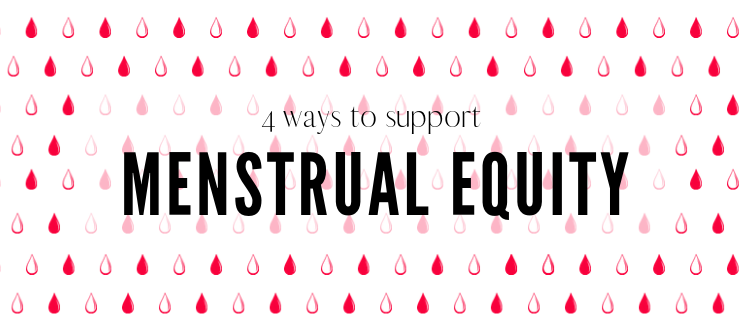4 Ways to Support Menstrual Equity!

#myperiodNOshame: My name is Maria Ignacia and I have been menstruating for 13 years. I got my first period when I was 12 after my family and I moved to the United States from Chile. I wasn’t extremely thrilled about what was happening. I was actually annoyed since it had come a whole year earlier than it was supposed to, according to my doctor who predicted I would get it when I was 13...
I believe the stress of moving to a new country, learning a new language, making new friends, and eating different foods caused my period to show up when it did. As I was going through a lot of transition in my life at the age of 12, I don’t remember a lot about the experience. I just remember waking up, going to the bathroom, seeing blood, yelling for my mom (in a small apartment with 6 people), my mom coming in and running back out to check my bed sheets for blood. Fortunately, my mom and my school had superficially prepared me for this moment. I had a basic understanding of what was going on and all I had to figure out was how the hell I would change my pads at this brand new school in the U.S. every 2-3 hours.
– Maria Ignacia Miranda Santis, WVE’s Program & Outreach Manager
Note: Keep an eye out for more #myperiodNOshame stories. We’ll be sharing these throughout our website — in blog posts, articles and more. Have a story to share? Email us today!
——————————————————————–
What is menstrual equity?
Simply put, menstrual equity is the equal access to safe and healthy menstrual care products, as well as education about reproductive healthcare. While the term is finally making it into the mainstream, the work to make period health a priority has been going on for decades by passionate advocates and individuals all over the world.
OK, so what does that actually look like?
Most folx think that menstrual equity means free period products, like tampons and pads. And in fact, many of the menstrual equity bills that have been introduced and passed in the recent years have addressed the issue of taxes on menstrual products (often referred to as the “tampon tax”), as well as provide free menstrual products in public schools, government buildings, prisons and correctional facilities.
Equally important to menstrual equity is the issue of product safety. Testing continues to raise alarm about the chemicals that are found in many tampons, pads, period underwear, personal wipes, washes and douches. And what’s worse, ingredients in these products are not fully disclosed. Important ingredient disclosure bills, like Congresswoman Meng’s Menstrual Products Right to Know Act, and New York state’s A.164/S.2387 are helping to put an end to toxic secrets in all period products.
These are all incredibly important bills that go beyond simply making products safer, more accessible and affordable— they uplift the fact that these products are a necessity for proper healthcare.
But menstrual equity isn’t just about products…
While ensuring menstrual products are safe, affordable and accessible is eliminating some of the barriers people who menstruate have, even getting to that point requires a lot of work to de-stigmatize periods.
Stigma is a set of negative and often unfair beliefs that a society or group of people have about something, in this case, periods. “Aunt flow”. “Your time of the month”. “Shark week”. “Lady business”. Do these sound familiar? Any other code word or phrase you use so you don’t say period or menstruation is the result of stigma and taboo.
Stigma is what has allowed governing bodies to tax period products as a luxury item for decades. Stigma is what has allowed manufacturers to hide harmful ingredients from the people who use these products. Stigma is what has prevented decision-makers, educators, healthcare providers and individuals from making menstrual health a priority in our homes, in our communities and in our cultures.
But don’t worry, there are ways we can fight stigma and normalize periods!
The first and most important thing you can start is to start talking about your period. You can start with people who are closest to you and other folx from there. You can tell people you are on your period. You can also start telling people about your first period, like I did above, and see if others want to tell you their story as well. By creating dialogues about very real and normal things people go through, such as menstruating, we are effectively dismantling the stigma (de-stigmatizing) of menstruation. By sharing your story, you are participating in a crucial way of combating menstrual stigma. By combating menstrual stigma, you are fighting for menstrual equality!!
4 Ways to Start Now!
There are ways you can advocate for menstrual equity and make sure that you are taking care of yourself and those around you:
1. Get the conversation started: I can’t say it enough… 🙂 Share your period story with those around you. Talk about menstruation with people. Listen to what others have to say about their menstruation experience. TALK ABOUT IT. The main antidote for stigma is talking about whatever it is you are trying to de-stigmatize. So go talk!
2. Get social: DOWNLOAD and PRINT this flyer. Write a few thoughts on what menstrual equity means to you, snap a pic & post on Instagram or Facebook with hashtags #myperiodnoshame and we’ll feature it on our Menstrual Equity page.
3. Advocate for affordable and safe products at your school, business, employment, etc: There are plenty of organizations and people funding opportunities to make sure period products are accessible to everyone and anyone. For example, a free menstrual product bill was introduced and passed in CO this past legislative session. And check out taxfreeperiod.com to find out more about what your state is up to…
You can also support federal legislation, like Congresswoman Meng’s Menstrual Equity for All Act, and Menstrual Products Right to Know Act that will put an end to ingredient secrets in tampons, pads, menstrual cups and period underwear.
4. Be a leader in your community: Text PERIOD to 52886 to stay updated on future opportunities to get connected with us and involved in menstrual equity activism in your community. Also, check out our workshop summary “Our Stories, Our Flow” that we did in NY.



